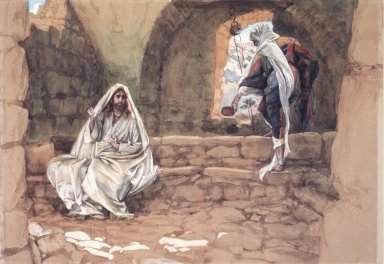“God, be merciful to me a sinner!“
[powerpress]
an excerpt from today’s reflection by Don Schwager:
How can we know if our prayer is pleasing to God or not? The prophet Hosea, who spoke in God’s name, said: “I desire steadfast love and not sacrifice” (Hosea 6:6). The prayers and sacrifices we make to God mean nothing to him if they do not spring from a heart of love for God and for one’s neighbor. How can we expect God to hear our prayers if we do not approach him with humility and with a contrite heart that seeks mercy and forgiveness? We stand in constant need of God’s grace and help. That is why Scripture tells us that “God opposes the proud, but gives grace to the humble” (James 4:6; Proverbs 3:34).
Jesus reinforced this warning with a vivid story of two people at prayer. Why did the Lord accept one person’s prayer and reject the  other’s prayer? Luke gives us a hint: despising one’s neighbor closes the door to God’s heart. Expressing disdain and contempt for others is more than being mean-minded. It springs from the assumption that one is qualified to sit in the seat of judgment and to publicly shame those who do not conform to our standards and religious practices. Jesus’ story caused offense to the religious-minded Pharisees who regarded “tax collectors” as unworthy of God’s grace and favor. How could Jesus put down a “religious person” and raise up a “public sinner”?
other’s prayer? Luke gives us a hint: despising one’s neighbor closes the door to God’s heart. Expressing disdain and contempt for others is more than being mean-minded. It springs from the assumption that one is qualified to sit in the seat of judgment and to publicly shame those who do not conform to our standards and religious practices. Jesus’ story caused offense to the religious-minded Pharisees who regarded “tax collectors” as unworthy of God’s grace and favor. How could Jesus put down a “religious person” and raise up a “public sinner”?
Jesus’ parable speaks about the nature of prayer and our relationship with God. It does this by contrasting two very different attitudes towards prayer. The Pharisee, who represented those who take pride in their religious practices, exalted himself at the expense of others. Absorbed with his own sense of self-satisfaction and self-congratulation, his boastful prayer was centered on his good religious practices rather than on God’s goodness, grace, and pardon. Rather than humbling himself before God and asking for God’s mercy and help, this man praised himself while despising those he thought less worthy. The Pharisee tried to justify himself before God and before those he despised; but only God can justify us. The tax collector, who represented those despised by religious-minded people, humbled himself before God and begged for mercy. His prayer was heard by God because he had true sorrow for his sins. He sought God with humility rather than with pride.
This parable presents both an opportunity and a warning. Pride leads to self-deception and spiritual blindness. True humility helps us to see ourselves as we really are in God’s eyes and it inclines us to seek God’s help and mercy. God dwells with the humble of heart who recognize their own sinfulness and who acknowledge God’s mercy and saving grace. I dwell in the high and holy place, and also with him who is of a contrite and humble spirit (Isaiah 57:15). God cannot hear us if we boast in ourselves and despise others. Do you humbly seek God’s mercy and do you show mercy to others, especially those you find difficult to love and to forgive?
“Lord Jesus, may your love and truth transform my life – my inner thoughts, intentions, and attitudes, and my outward behavior, speech, and actions. Where I lack charity, kindness, and foreberance, help me to embrace your merciful love and to seek the good of my neighbor, even those who cause me ill-favor or offense. May I always love as you have loved and forgive others as you have forgiven.”
for the full reflection visit : Daily Reading and Meditation
Tags: God's mercy, Lord Jesus, religious practices
This entry was posted on Saturday, March 29th, 2014 at 9:16 am
You can follow any responses to this entry through the RSS 2.0 feed.
“Love the Lord with all your heart, soul, mind, and strength”
[powerpress]
an excerpt from today’s reflection by Don Schwager: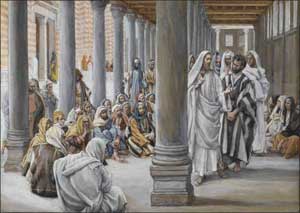
How does love and obedience to God’s law go together? The Pharisees prided themselves in the knowledge of the law and their ritual requirements. They made it a life-time practice to study the six hundred and thirteen precepts of the Old Testament along with the numerous rabbinic commentaries. They tested Jesus to see if he correctly understood the law as they did. Jesus startled them with his profound simplicity and mastery of the law of God and its purpose. What does God require of us? Simply that we love as he loves! God is love and everything he does flows from his love for us. God loved us first and our love for him is a response to his exceeding grace and kindness towards us. The love of God comes first and the love of neighbor is firmly grounded in the love of God. The more we know of God’s love and truth the more we love what he loves and reject what is hateful and contrary to his will.
What makes our love for God and his commands grow in us? Faith in God and hope in his promises strengthen us in the love of God. They are essential for a good relationship with God, for being united with him. The more we know of God the more we love him and the more we love him the greater we believe and hope in his promises. The Lord, through the gift of the Holy Spirit, gives us a new freedom to love as he loves (Galatians 5:13). Do you allow anything to keep you from the love of God and the joy of serving others with a generous heart? Paul the Apostle says: hope does not disappoint us, because God’s love has been poured into our hearts through the Holy Spirit which has been given to us (Romans 5:5). Do you know the love which conquers all?
“We love you, O our God; and we desire to love you more and more. Grant to us that we may love you as much as we desire, and as much as we ought. O dearest friend, who has so loved and saved us, the thought of whom is so sweet and always growing sweeter, come with Christ and dwell in our hearts; that you keep a watch over our lips, our steps, our deeds, and we shall not need to be anxious either for our souls or our bodies. Give us love, sweetest of all gifts, which knows no enemy. Give us in our hearts pure love, born of your love to us, that we may love others as you love us. O most loving Father of Jesus Christ, from whom flows all love, let our hearts, frozen in sin, cold to you and cold to others, be warmed by this divine fire. So help and bless us in your Son.” (Prayer of Anselm, 12th century)
for the full reflection visit : Daily Reading and Meditation
Tags: catholic, catholic podcast, catholic prayer, Faith in God, relationship with God
This entry was posted on Friday, March 28th, 2014 at 5:09 am
You can follow any responses to this entry through the RSS 2.0 feed.
“If it is by the finger of God”
[powerpress]
an excerpt from today’s reflection by Don Schwager: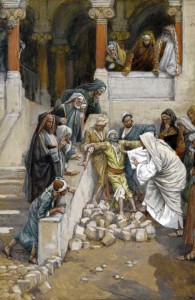
Jesus’ numerous exorcisms brought freedom to many who were troubled and oppressed by the work of evil spirits. Jesus himself encountered personal opposition and battled with Satan when he was put to the test in the wilderness just before his public ministry. He overcame the evil one through his obedience to the will of his Father. Some of the Jewish leaders reacted vehemently to Jesus’ healings and exorcisms and they opposed him with malicious slander. How could he get the power and authority to release individuals from Satan’s power? They assumed that he had to be in league with Satan. They attributed his power to Satan rather than to God.
Jesus answers their charge with two arguments. There were many exorcists in Palestine in Jesus’ time. So Jesus retorted by saying that they also incriminate their own kin who cast out demons. If they condemn Jesus they also condemn themselves. In his second argument he asserts that no kingdom divided against itself cannot survive for long? We have witnessed enough civil wars in our own time to prove the destructive force at work here for the annihilation of whole peoples and their land. If Satan lends his power against his own forces then he is finished. How can a strong person be defeated except by someone who is stronger? Jesus asserted his power and authority to cast out demons as a clear demonstration of the reign of God. Jesus’ reference to the finger of God points back to Moses’ confrontation with Pharoah and his magicians who represented Satan and the kingdom of darkness (see Exodus 8:19). Jesus claims to be carrying on the tradition of Moses whose miracles freed the Israelites from bondage by the finger of God. God’s power is clearly at work in the exorcisms which Jesus performed and they give evidence that God’s kingdom has come.
Jesus makes it clear that there are no neutral parties. We are either for Jesus or against him, for the kingdom of God or against it. There are two kingdoms in opposition to one another – the kingdom of God and the kingdom of darkness under the rule of Satan. If we disobey God’s word, we open to door to the power of sin and Satan in our lives. If you want to live in freedom from sin and Satan, then your house – your life and all you possess – must be occupied by Jesus where he is enthroned as Lord and Savior. Is the Lord Jesus the Master of your home, heart, mind, and will?
“O Lord, our God, grant us, we beseech you, patience in troubles, humility in comforts, constancy in temptations, and victory over all our spiritual foes. Grant us sorrow for our sins, thankfulness for your benefits, fear of your judgment, love of your mercies, and mindfulness of your presence; now and for ever.” (Prayer by John Cosin)
for the full reflection visit : Daily Reading and Meditation
Tags: catholic, catholic podcast, catholic prayer
This entry was posted on Thursday, March 27th, 2014 at 12:03 am
You can follow any responses to this entry through the RSS 2.0 feed.
“Whoever relaxes one of the commandments “
[powerpress]
an excerpt from today’s reflection by Don Schwager: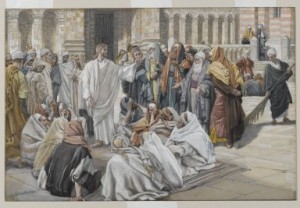
Jesus taught reverence for God’s law – reverence for God himself, for the Lord’s Day, reverence or respect for parents, respect for life, for property, for another person’s good name, respect for oneself and for one’s neighbor lest wrong or hurtful desires master us. Reverence and respect for God’s commandments teach us the way of love – love of God and love of neighbor. What is impossible to men and women is possible to God and those who put their faith and trust in God. Through the gift of the Holy Spirit the Lord transforms us and makes us like himself. We are a new creation in Christ (2 Corinthians 5:17) because “God’s love has been poured into our hearts through the Holy Spirit which has been given to us” (Romans 5:5). God gives us the grace to love as he loves, to forgive as he forgives, to think as he thinks, and to act as he acts. The Lord loves justice and goodness and he hates every form of wickedness and sin. He wants to set us free from our unruly desires and sinful habits, so that we can choose to live each day in the peace, joy, and righteousness of his Holy Spirit (Romans 14: 17). To renounce sin is to turn away from what is harmful and destructive for our minds and hearts, and our very lives. As his followers we must love and respect his commandments and hate every form of sin. Do you love and revere the commands of the Lord?
“Lord Jesus, grant this day, to direct and sanctify, to rule and govern our hearts and bodies, so that all our thoughts, words and deeds may be according to your Father’s law and thus may we be saved and protected through your mighty help.”
for the full reflection visit : Daily Reading and Meditation
Tags: catholic, catholic podcast, catholic prayer
This entry was posted on Wednesday, March 26th, 2014 at 12:03 am
You can follow any responses to this entry through the RSS 2.0 feed.
“You have found favor with God“
[powerpress]
an excerpt from today’s reflection by Don Schwager: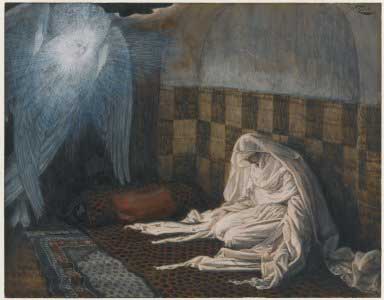
How does Mary respond to the word of God delivered by the angel Gabriel? She knows she is hearing something beyond human capability. It will surely take a miracle which surpasses all that God has done previously. Her question, “how shall this be, since I have no husband” is not prompted by doubt or skepticism, but by wonderment! She is a true hearer of the Word and she immediately responds with faith and trust. Mary’s prompt response of “yes” to the divine message is a model of faith for all believers.
Mary believed God’s promises even when they seemed impossible. She was full of grace because she trusted that what God said was true and would be fulfilled. She was willing and eager to do God’s will, even if it seemed difficult or costly. Mary is the “mother of God” because God becomes incarnate when he takes on flesh in her womb. When we pray the ancient creed (Nicene Creed) we state our confession of faith in this great mystery: “For us men and for our salvation he came down from heaven; by the power of the Holy Spirit, he became incarnate of the Virgin Mary, and was made man.”
“Heavenly Father, you offer us abundant grace, mercy, and forgiveness through your Son, Our Lord Jesus Christ. Help me to live a grace-filled life as Mary did by believing in your promises and by giving you my unqualified ‘yes’ to your will and plan for my life.”
for the full reflection visit : Daily Reading and Meditation
Tags: catholic, catholic podcast, catholic prayer
This entry was posted on Tuesday, March 25th, 2014 at 8:27 am
You can follow any responses to this entry through the RSS 2.0 feed.
“Jesus’ word of judgment“
[powerpress]
an excerpt from today’s reflection by Don Schwager: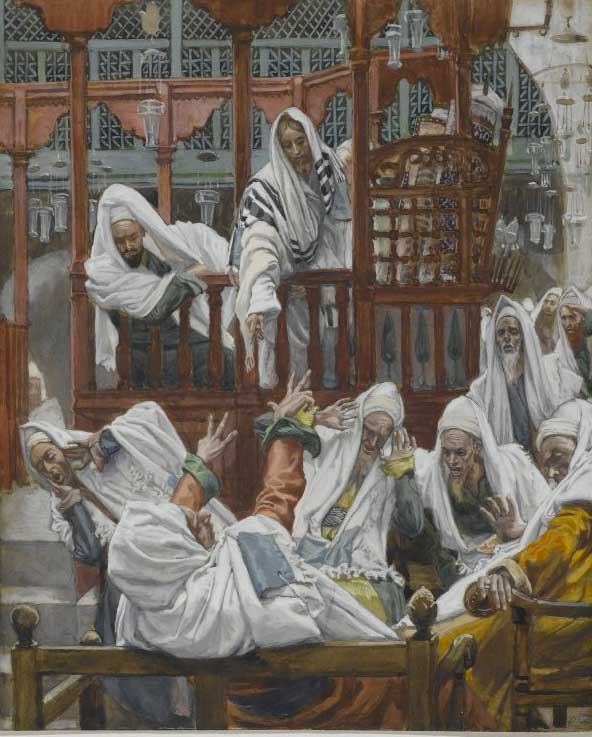
When Jesus proclaimed the good news of God’s kingdom to his own people, he did not hesitate to confront them with their sin of indifference and unbelief. He startled his listeners in the synagogue at Nazareth with a seeming rebuke that no prophet or servant of God can receive honor among his own people. He then angered them when he complimented the Gentiles who seemed to have shown more faith in God than the “chosen ones” of Israel. The Jews regarded the unbelieving Gentiles as “fuel for the fires of hell.” Jesus’ praise for “outsiders” offended the hears of his own people because they were blind-sighted to God’s mercy and plan of redemption for all nations. The word of warning and judgment spoken by Jesus was met with hostility by his own people. They forcibly threw him out of the town and would have done him harm had he not stopped them.
The Lord Jesus offers healing and pardon to all who humbly ask for his mercy and help. He will set us free from every sinful habit and every harmful way of relating to our neighbor, if we allow him to cleanse and heal us. If we want to walk in freedom and grow in love and holiness, then we must humbly renounce our sinful ways and submit to Christ’s instruction and healing for our lives. Scripture tells us that the Lord disciplines us for our good that we may share his holiness (Hebrews 12:10). Do you want the Lord Jesus to set you free from every sinful pattern and to make you whole and well again? Ask him to show you the way to walk in his love and truth.
“Lord Jesus, teach me to love your ways that I may be quick to renounce sin and wilfulness in my life. Make me whole and clean again that I may I delight to do your will.”
for the full reflection visit : Daily Reading and Meditation
Tags: catholic, catholic podcast, catholic prayer
This entry was posted on Monday, March 24th, 2014 at 12:03 am
You can follow any responses to this entry through the RSS 2.0 feed.
“Whoever drinks of the water that I shall give will never thirstâ€
an excerpt from today’s reflection by Don Schwager:
Would you give water to somebody who snubbed you or treated you like an enemy? Jesus did just that and more! He treated Samaritans, the sworn enemies of the Jews, with great kindness and respect. The Jews and the Samaritans who lived in Israel between Galilee and Judaea, had been divided for centuries. They had no dealings with one another, avoiding all social contact, even trade, and inter-marriage. If their paths crossed it would not be unusual for hostility to break out. When Jesus decided to pass through Samaria he stopped at Jacob’s well because it was mid-day and he was both exhausted and thirsty. Jacob’s well was a good mile and a half from the nearest town, called Sychar. It wasn’t easy to draw water from this well since it was over a hundred feet deep. Jesus had neither rope nor bucket to fetch the water. When a Samaritan woman showed up at the well, both were caught by surprise. Why would a Samaritan woman walk a mile and a half in the mid-day heat to fetch her water at a remote well rather than in the local town? She was an outcast and not welcomed among her townspeople. Jesus then did something no respectable Jew would think of doing. He reached out to a Samaritan, thus risking ritual impurity and scorn from his fellow Jews. He also did something no strict Rabbi would dare to do in public without loss to his reputation. He greeted the woman and spoke openly with her. Not only was she a woman, but an adulteress and public sinner as well. No decent Jew or Samaritan would even think of being seen with such a woman, let alone exchanging a word with her!
Jesus broke through the barriers of prejudice, hostility, and tradition to bring the good news of peace and reconciliation to Jews, Samaritans, and Gentiles alike. He demonstrated the universality of the gospel both in word and deed. No one is barred from the love of God and the good news of salvation. There is only one thing that can keep us from God and his redeeming love – our stubborn pride and wilful rebellion.
What is the point of Jesus’ exchange with the Samaritan woman about water? Water in the arid land was scarce. Jacob’s well was located in a strategic fork of the road between Samaria and Galilee. One can live without food for several days, but not without water. Water is a source of life and growth for all living things. When rain came to the desert, the water transformed the wasteland into a fertile field. The kind of water which Jesus spoke about was living, running, fresh, pure water. Fresh water from a cool running stream was always preferred to the still water one might find in a pool or resevoir. When the Israelites complained about lack of water in the wilderness, God instructed Moses to strike the rock and a stream of fresh living water gushed out (Exodus17:6 ). Even though the Israelites did not trust God to care for them in the wilderness, God, nonetheless gave them abundant water and provision through the intercession of his servant Moses.
The image of “living water” is used throughout the scriptures as a symbol of God’s wisdom, a wisdom that imparts life and blessing to all who receive it. “The teaching of the wise is a fountain of life†(Proverbs 13:14). “Living water” was also a symbol for the Jews of thirst of the soul for God. The water which Jesus spoke of symbolized the Holy Spirit and his work of recreating us in God’s image and sustaining in us the new life which comes from God. The life which the Holy Spirit produces in us makes us a “new creation” in Jesus Christ (2 Corinthians 5:17). Do you thirst for God and for the life of the Holy Spirit within you?
“Lord Jesus, my soul thirsts for you. Fill me with your Holy Spirit that I may always find joy in your presence and take delight in doing your will.â€
for the full reflection visit : Daily Reading and Meditation
Tags: Jesus, Samaritan, Samaritans
This entry was posted on Sunday, March 23rd, 2014 at 12:01 am
You can follow any responses to this entry through the RSS 2.0 feed.
“They will respect my son“
[powerpress]
an excerpt from today’s reflection by Don Schwager:
What is the message of the parable of the vineyard? Jesus’ story about an absentee landlord and his not-so-good tenants would have made sense to his audience. The hills of Galilee were lined with numerous vineyards, and it was quite common for the owners to let out their estates to tenants. Many did it for the sole purpose of collecting rent.Why did Jesus’ story about wicked tenants cause offense to the scribes and Pharisees? It contained both a prophetic message and a warning. Isaiah had spoken of the house of Israel as “the vineyard of the Lord” (Isaiah 5:7). Jesus’ listeners would likely understand this parable as referring to God’s dealing with a stubborn and rebellious people.
This parable speaks to us today as well. It richly conveys some important truths about God and the way he deals with his people. First, it tells us of God’s generosity and trust. The vineyard is well equipped with everything the tenants need. The owner went away and left the vineyard in the hands of the tenants. God, likewise trusts us enough to give us freedom to run life as we choose. This parable also tells us of God’s patience and justice. Not once, but many times he forgives the tenants their debts. But while the tenants take advantage of the owner’s patience, his judgment and justice prevail in the end.
Jesus foretold both his death and his ultimate triumph. He knew he would be rejected and be killed, but he also knew that would not be the end. After rejection would come glory – the glory of resurrection and ascension to the right hand of the Father. The Lord blesses his people today with the gift of his kingdom. And he promises that we will bear much fruit if we abide in him (see John 15:1-11). He entrusts his gifts and grace to each of us and he gives us work to do in his vineyard – the body of Christ. He promises that our labor will not be in vain if we persevere with faith to the end (see 1 Corinthians 15:58). We can expect trials and even persecution. But in the end we will see triumph. Do you labor for the Lord with joyful hope and with confidence in his victory?
“Thank you, Lord Jesus Christ, for all the benefits which you have given us; for all the pains and insults which you have borne for us. O most merciful redeemer, friend, and brother, may we know you more clearly, love you more dearly, and follow you more nearly, for your own sake.” (prayer of St. Richard of Chichester, 13th century)
for the full reflection visit : Daily Reading and Meditation
Tags: catholic, catholic podcast, catholic prayer
This entry was posted on Friday, March 21st, 2014 at 12:02 am
You can follow any responses to this entry through the RSS 2.0 feed.
“Lazarus was carried by the angels to Abraham’s bosom” [powerpress] an excerpt from today’s reflection by Don Schwager: What sustains you when trials and affliction come your way? Jeremiah tells us that whoever relies on God will not be disappointed or be in want when everything around them dries up or disappears. God will not only be their consolation, but their inexhaustible source of joy as well. Jesus’ parable about the afflictions of the poor man Lazarus brings home a similar point. In this story Jesus paints a dramatic scene of contrasts – riches and poverty, heaven and hell, compassion and indifference, inclusion and exclusion. We also see an abrupt and dramatic reversal of fortune. Lazarus was not only poor, but sick and unable to lift himself. He was “laid†at the gates of the rich man’s house. The dogs which licked his sores probably also stole the little bread he got for himself. Dogs in the ancient world symbolized contempt. Enduring the torment of these savage dogs only added to the poor man’s miseries and sufferings. The rich man treated the beggar with contempt and indifference, until he found his fortunes reversed at the end of his life! In God’s economy, those who hold on possessively to what they have, lose it all in the end, while those who share generously receive back many times more than they gave way. The name Lazarus means God is my help. Despite a life of misfortune and suffering, Lazarus did not lose hope in God. His eyes were set on a treasure stored up for him in heaven. The rich man, however, could not see beyond his material wealth and possessions. He not only had every thing he needed, he selfishly spent all he had on himself. He was too absorbed in what he possessed to notice the needs of those around him. He lost sight of God and the treasure of heaven because he was preoccupied with seeking happiness in material things. He served wealth rather than God. In the end the rich man became a beggar! Do you know the joy and freedom of possessing God as your true and lasting treasure? Those who put their hope and security in heaven will not be disappointed (see Hebrews 6:19)? “Lord Jesus, you are my joy and my treasure. Make me rich in the things of heaven and give me a generous heart that I may freely share with others the spiritual and material treasures you have given to me.” for the full reflection visit : Daily Reading and Meditation
What sustains you when trials and affliction come your way? Jeremiah tells us that whoever relies on God will not be disappointed or be in want when everything around them dries up or disappears. God will not only be their consolation, but their inexhaustible source of joy as well. Jesus’ parable about the afflictions of the poor man Lazarus brings home a similar point. In this story Jesus paints a dramatic scene of contrasts – riches and poverty, heaven and hell, compassion and indifference, inclusion and exclusion. We also see an abrupt and dramatic reversal of fortune. Lazarus was not only poor, but sick and unable to lift himself. He was “laid†at the gates of the rich man’s house. The dogs which licked his sores probably also stole the little bread he got for himself. Dogs in the ancient world symbolized contempt. Enduring the torment of these savage dogs only added to the poor man’s miseries and sufferings. The rich man treated the beggar with contempt and indifference, until he found his fortunes reversed at the end of his life! In God’s economy, those who hold on possessively to what they have, lose it all in the end, while those who share generously receive back many times more than they gave way. The name Lazarus means God is my help. Despite a life of misfortune and suffering, Lazarus did not lose hope in God. His eyes were set on a treasure stored up for him in heaven. The rich man, however, could not see beyond his material wealth and possessions. He not only had every thing he needed, he selfishly spent all he had on himself. He was too absorbed in what he possessed to notice the needs of those around him. He lost sight of God and the treasure of heaven because he was preoccupied with seeking happiness in material things. He served wealth rather than God. In the end the rich man became a beggar! Do you know the joy and freedom of possessing God as your true and lasting treasure? Those who put their hope and security in heaven will not be disappointed (see Hebrews 6:19)? “Lord Jesus, you are my joy and my treasure. Make me rich in the things of heaven and give me a generous heart that I may freely share with others the spiritual and material treasures you have given to me.” for the full reflection visit : Daily Reading and Meditation
Tags: catholic, catholic podcast, catholic prayer
This entry was posted on Thursday, March 20th, 2014 at 12:07 am
You can follow any responses to this entry through the RSS 2.0 feed.
“Joseph did as the angel of the Lord commanded him“
[powerpress]
an excerpt from today’s reflection by Don Schwager:
Are you prepared to obey the Lord in everything? Faith in God’s word and obedience to his commands go hand in hand. Joseph, like Mary, is a model of faith and justice. Matthew tells us that Joseph was a “just manâ€. John Chrysostom, the great 5th century father writes:“The concept of ‘just’ here signifies the man who possesses all the virtues. By ‘justice’ one at times understands only one virtue in particular, as in the phrase: the one who is not avaricious (greedy) is just. But ‘justice’ also refers to virtue in general. And it is in this sense, above all, that scripture uses the word ‘justice’. For example, it refers to: ‘a just man and true’ (cf. Job 1:1), or the two were just (cf. Luke 1:6). Joseph, then, being just, that is to say good and charitable…â€
Joseph’s faith was put to the test when he discovered that his espoused wife Mary was pregnant. Joseph, being a just and God-fearing man, did not wish to embarrass, punish, or expose Mary to harm. To all outward appearances she had broken their solemn pledge to be faithful and chaste to one another. Joseph, no doubt took this troubling matter to God in prayer. He was not hasty to judge or to react with hurt and anger. God rewarded him not only with guidance and consolation, but with the divine assurance that he had indeed called Joseph to be the husband of Mary and to assume a mission that would require the utmost faith, confidence, and trust in Almighty God. Joseph believed in the divine message to take Mary as his wife and to accept the child in her womb as the promised Messiah, who is both the only begotten Son of God and son of Mary conceived by the Holy Spirit.
was not hasty to judge or to react with hurt and anger. God rewarded him not only with guidance and consolation, but with the divine assurance that he had indeed called Joseph to be the husband of Mary and to assume a mission that would require the utmost faith, confidence, and trust in Almighty God. Joseph believed in the divine message to take Mary as his wife and to accept the child in her womb as the promised Messiah, who is both the only begotten Son of God and son of Mary conceived by the Holy Spirit.
Joseph was a worthy successor to the great patriarchs of the old covenant – Abraham, Isaac, and Jacob. Joseph followed the call of God through the mysterious circumstances that surrounded the coming of Jesus, the long-awaited Messiah who fulfilled all the promises made to Abraham and his offspring. God entrusted this silent, humble man with the unique privilege of raising, protecting, teaching, and training Jesus as a growing child. Joseph accepted his role of fatherly care with faith, trust, and obedience to the will of God. He is a model for all who are entrusted with the care, instruction, and protection of the young. Joseph is a faithful witness and servant of God’s unfolding plan of redemption. Are you ready to put your trust in the Lord to give you his help and guidance in fulfilling your responsibilities? God gives strength and guidance to those who seek his help, especially when we face trials, doubts, fears, perplexing circumstances, and what seems like insurmountable problems and challenges in our personal lives. God our heavenly Father has not left us alone, but has given us his only begotten Son Jesus as our savior, teacher, lord, and healer. Where do you need God’s help and guidance? Ask the Lord to increase your faith and trust in his promises and in his guiding hand in your life.
“Lord Jesus, you came to free us from the power of sin, fear, death, and Satan, and to heal and restore us to wholeness of life. May I always trust in your saving help, guidance, wisdom, and plan for my life”.
for the full reflection visit : Daily Reading and Meditation
Tags: catholic, catholic podcast, catholic prayer
This entry was posted on Wednesday, March 19th, 2014 at 12:02 am
You can follow any responses to this entry through the RSS 2.0 feed.
“Whoever humbles himself will be exalted”
[powerpress]
an excerpt from today’s reflection by Don Schwager:
Respect for God and his ways inclines us to Godly humility and simplicity of heart. What is true humility and why should we embrace it? True humility is not feeling bad about yourself, or having a low opinion of yourself, or thinking of yourself as inferior to others. True humility frees us from preoccupation with ourselves, whereas a low self-opinion tends to focus our attention on ourselves. Humility is truth in self-understanding and truth in action. Viewing ourselves truthfully, with sober judgment, means seeing ourselves the way God sees us (Psalm 139:1-4). A humble person makes a realistic assessment of oneself without illusion or pretense to be something one is not. A truly humble person regards oneself neither smaller nor larger than one truly is. True humility frees us to be ourselves as God sees us and to avoid despair and pride. A humble person does not want to wear a mask or put on a facade in order to look good to others. Such a person is not swayed by accidentals, such as fame, reputation, success, or failure. Do you know the joy of Christ-like humility and simplicity of heart?
Humility is the queen or foundation of all the other virtues because it enables us to see and judge correctly, the way God sees. Humility helps us to be teachable so we can acquire true knowledge, wisdom, and an honest view of reality. It directs our energy, zeal, and ambition to give ourselves to something greater than ourselves. Humility frees us to love and serve others selflessly, for their sake, rather than our own. Paul the Apostle gives us the greatest example and model of humility in the person of Jesus Christ, who emptied himself, taking the form of a servant, and …who humbled himself and became obedient unto death, even death on a cross (Philippians 2:7-8). Do you want to be a servant as Jesus served and loved others? The Lord gives grace to those who humbly seek him.
“Lord Jesus, you became a servant for my sake to set me free from the tyranny of selfish pride and self-concern. Teach me to be humble as you are humble and to love others generously with selfless service and kindness.”
for the full reflection visit : Daily Reading and Meditation
Tags: catholic, catholic podcast, catholic prayer
This entry was posted on Tuesday, March 18th, 2014 at 12:03 am
You can follow any responses to this entry through the RSS 2.0 feed.
“Forgive, and you will be forgiven“
[powerpress]
an excerpt from today’s reflection by Don Schwager: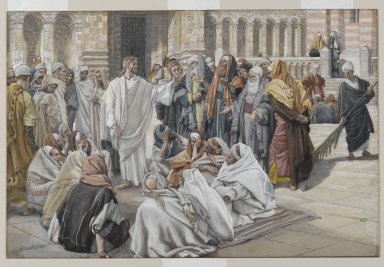
What makes true disciples of Jesus Christ different from those who do not know the Lord Jesus and what makes Christianity distinct from any other religion? It is grace – treating others not as they deserve, but as God wishes them to be treated – with loving-kindness, forebearance, and mercy. God shows his goodness to the unjust as well as to the just. His love embraces saint and sinner alike. God always seeks what is best for each one of us and he teaches us to seek the greatest good of others, even those who hate and abuse us. Our love for others, even those who are ungrateful and unkind towards us, must be marked by the same kindness and mercy which God has shown to us. It is easier to show kindness and mercy when we can expect to benefit from doing so. How much harder when we can expect nothing in return. Our prayer for those who do us ill both breaks the power of revenge and releases the power of love to do good in the face of evil.
How can we possibly love those who cause us grief, ill-will, and harm? With God all things are possible. He gives power and grace to those who trust in his love and who seek his help and wisdom. The Lord is ready to work in and through us by his Holy Spirit, both to purify our minds and hearts and to guide us in choosing what is good and loving. Paul the Apostle reminds us that “God’s love has been poured into our hearts through the Holy Spirit which has been given to us” (Romans 5:5) God’s love conquers all, even our hurts, injuries, fears, and prejudices. Only the cross of Jesus Christ and his victory over sin can free us from the tyranny of malice, hatred, revenge, and resentment, and give us the courage to overcome evil with good (Romans 12:21). Such love and grace has power to heal, restore, and transform us into the image of Christ. Do you know the power of Christ’s redeeming love and mercy?
“Lord Jesus, your love brings freedom, pardon, and joy. Transform my heart with your love that nothing may make me lose my temper, ruffle my peace, take away my joy, or make me bitter towards anyone.”
for the full reflection visit : Daily Reading and Meditation
Tags: catholic, catholic podcast, catholic prayer
This entry was posted on Monday, March 17th, 2014 at 12:44 am
You can follow any responses to this entry through the RSS 2.0 feed.
“Love and pray for your enemies“
[powerpress]
an excerpt from today’s reflection by Don Schwager: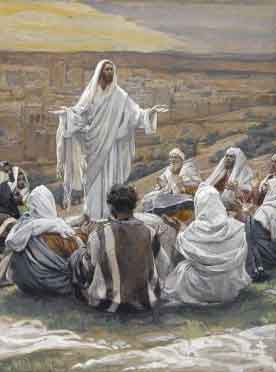
Do you know the love that conquers every fear, sin, and selfish desire? God renews his love for us each and every day. His love has the power to free us from every form of evil – selfishness, greed, anger, hatred, jealously and envy. What’s the distinctive feature of Jesus’ life and the life of those transformed by his redeeming love? It’s grace – treating others, not as they deserve, but as God wishes them to be treated – with loving-kindness and mercy. Jesus is God’s grace incarnate. His love is unconditional and is wholly directed towards our good. God is good to all, the just and the unjust. His love embraces saint and sinner alike. That’s why Jesus willingly went to the cross for our sake, to free us from the power of sin, ignorance, and prejudice. God’s grace sets us free from everything that would keep us from him and his love. How can we possibly love as God loves and overcome evil with good? With God all things are possible. He gives grace in abundance through the gift of the Holy Spirit, who converts our hearts and minds and teaches us how to live according to God’s truth and love.
Was Jesus exaggerating when he said we must be perfect as our heavenly Father is perfect? The original meaning of “perfect” in Aramaic is “completeness” or “wholeness” – not lacking in what is essential. God gives us every good gift in Jesus Christ so that we may not lack anything we need to carry out his will and to live as his sons and daughters. He knows our frailty and sinfulness better than we do. And he assures us of his grace and help to follow in his ways. In the cross of Jesus we see the way of perfect love. Do you want to grow in the knowledge, wisdom, and love of God? Ask the Holy Spirit to set your heart on fire with the love of God.
“Give  us, Lord, a humble, quiet, peaceable, patient, tender and charitable mind, and in all our thoughts, words and deeds a taste of the Holy Spirit. Give us, Lord, a lively faith, a firm hope, a fervent charity, and love of you. Take from us all lukewarmness in meditation, dullness in prayer. Give us fervor and delight in thinking of you and your grace, your tender compassion towards me. The things we pray for, good Lord, give us grace to labor for: through Jesus Christ our Lord. “ (Prayer of Thomas More)
for the full reflection visit : Daily Reading and Meditation
Tags: catholic, catholic podcast, catholic prayer
This entry was posted on Saturday, March 15th, 2014 at 6:17 am
You can follow any responses to this entry through the RSS 2.0 feed.
“Do not be angry, be reconciled“
[powerpress]
an excerpt from today’s reflection by Don Schwager: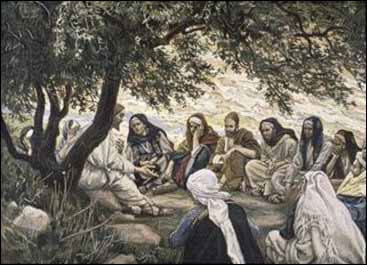
Do you allow sin or anger to master your life? The first person to hate his brother was Cain. God warned Cain: ‘Why are you angry? ..Sin in couching at the door; it’s desire is for you, but you must master it (Genesis 4:6-7). Sin doesn’t just happen; it first grows as a seed in one’s heart. Unless it is mastered, by God’s grace, it grows like a weed and chokes the life out of us. Jesus addressed the issue of keeping the commandments with his disciples. The scribes and Pharisees equated righteousness with satisfying the demands of the law. Jesus showed them how short they had come. Jesus points to the heart as the seat of desire, choice, and intention. Unless forbidden and evil desires are uprooted and cut-out, the heart will be poisoned and the body become a slave to sin and passion. Jesus illustrates his point with the example of the commandment to not kill. Murder first starts in the heart as the seed of forbidden anger that grows within until it springs into words and actions against one’s brother or neighbor. This is a selfish anger that broods and is long-lived, that nurses a grudge and keeps wrath warm, and that refuses to die. Anger in the heart as well as anger in speech or action are equally forbidden. The Lord Jesus commands by grace – take away the anger in your heart and there will be no murder.
What is the antidote for overcoming anger and rage? Mercy, forbearance, and kindness spring from a heart full of love and forgiveness. God has forgiven us and he calls us to extend mercy and forgiveness towards those who cause us grief or harm. In the cross of Jesus we see the supreme example of love and the power for overcoming evil. Only God’s love and grace can set our hearts and minds free from the tyranny of wounded pride and spiteful revenge. Do you harbor any anger towards another person? And are you quick to be reconciled when a rupture has been caused in your relationships? Ask God to set you free and to fill your heart and mind with his love and truth.
Do you seek to live peaceably and charitably with all?
“Lord Jesus, my heart is cold. Make it warm, compassionate, and forgiving towards all, even those who do me harm. May I only think and say what is pleasing to you and be of kind service to all I meet.â€
for the full reflection visit : Daily Reading and Meditation
Tags: catholic, catholic podcast, catholic prayer
This entry was posted on Friday, March 14th, 2014 at 12:03 am
You can follow any responses to this entry through the RSS 2.0 feed.
“How much more will your Father who is in heaven give good things to those who ask him!”
[powerpress]
an excerpt from today’s reflection by Don Schwager: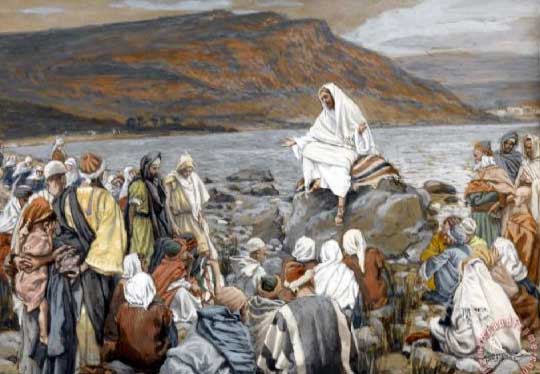
Those who know and trust in God’s love, pray with great boldness. Listen to what John Chrysostom, a 5th century church father, has to say about the power of prayer: “Prayer is an all-efficient panoply [i.e. ‘a full suit of armor’ or ‘splendid array’], a treasure undiminished, a mine never exhausted, a sky unobstructed by clouds, a haven unruffled by storm. It is the root, the fountain, and the mother of a thousand blessings. It exceeds a monarch’s power. ..I speak not of the prayer which is cold and feeble and devoid of zeal. I speak of that which proceeds from a mind outstretched, the child of a contrite spirit, the offspring of a soul converted – this is the prayer which mounts to heaven. ..The power of prayer has subdued the strength of fire, bridled the rage of lions, silenced anarchy, extinguished wars, appeased the elements, expelled demons, burst the chains of death, enlarged the gates of heaven, relieved diseases, averted frauds, rescued cities from destruction, stayed the sun in its course, and arrested the progress of the thunderbolt. In sum prayer has power to destroy whatever is at enmity with the good.â€
Prayer flows from the love of God; and the personal love we show to our neighbor is fueled by the love that God has poured into our hearts through the Holy Spirit (Romans 5:5). Jesus concludes his discourse on prayer with the reminder that we must treat our neighbor in the same way we wish to be treated by God and by others. We must not just avoid doing harm to our neighbor, we must actively seek his or her welfare. In doing so, we fulfill the law and the prophets, namely what God requires of us – loving God with all that we have and are and loving our neighbor as ourselves. The Holy Spirit is every ready to transform our lives in Jesus’ way of love. Do you thirst for holiness and for the fire of God’s love?
“Let me love you, my Lord and my God, and see myself as I really am – a pilgrim in this world, a Christian called to respect and love all whose lives I touch, those in authority over me or those under my authority, my friends and my enemies. Help me to conquer anger with gentleness, greed by generosity, apathy by fervor. Help me to forget myself and reach out towards others.” (Prayer attributed to Clement XI of Rome)
for the full reflection visit : Daily Reading and Meditation
Tags: catholic, catholic podcast, catholic prayer
This entry was posted on Thursday, March 13th, 2014 at 12:18 am
You can follow any responses to this entry through the RSS 2.0 feed.

